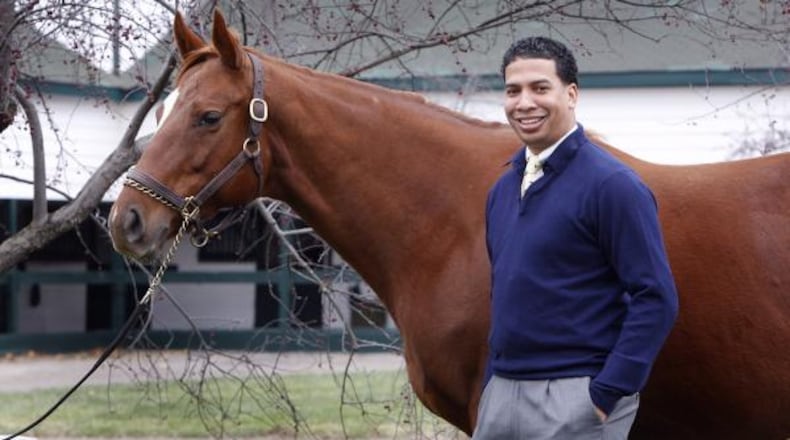Harbut’s job as a bloodstock owner has taken the Lexington, KY native to places like Japan, Dubai and Qatar.
Harbut said growing up, he thought he was going to join the FBI or the Secret Service. He had an interest in horses, he rode and played polo, but didn’t think he could have a career in equine industry. That changed when he was selected for an international study program.
Harbut said in his new role at Wilberforce, where he’s been given the opportunity to give guest lectures starting this month and potentially offer internships to students, he hopes to inspire students. He said he’d like to be an example of an entrepreneur who has “exemplified success in an area or arena is not necessarily open to diversity, more specifically to African Americans.”
“I’m hoping that I will be able to bring exposure from the standpoint of my line of business and, more importantly, for kids that may not be necessarily thinking of entering the equine business but maybe wanting to get involved in another field is sort of lacking diversity or not necessarily inclusive of others to be able to see an example of someone who has made it in an industry that lacks diversity,” Harbut said.
Harbut said the industry used to be more diverse, but today there are very few Blacks in the equine industry from jockeys to bloodstock owners, like himself. The industry is also mainly male, he said.
Fifteen of the first 28 Kentucky Derbies were won by Black jockeys.
Harbut said after Plessy vs. Ferguson, the landmark U.S. Supreme Court decision that upheld the idea of “separate but equal” facilities for white and Black people, the horse racing industry didn’t want to have separate white and Black horse races, so they pushed the Black people out of horse racing and out of ownership.
“I think we deal with a lot of individuals who have unconscious biases already built in,” he said. “You know some of these individuals unconsciously, doing things not necessarily realizing this.”
Harbut said that being an entrepreneur is not easy, and being a Black entrepreneur is also difficult. Many of his clients are foreign and that gives him a leg up, because those clients are also not very well represented in the horse racing industry.
“Outside of America, the main focus is being able to hire whoever to provide them the services they need to succeed. I am fortunate to represent some of the clients that I do represent,” Harbut said. “It’s a very unique ability to be able to identify talent, manage talent and to be able to produce results. At the end of the day when you’re in business, whether you own a company or you’re working for someone else, you are driven by results.”
His great grandfather, Will Harbut, was the groom and caretaker of the legendary, champion racer, Man o’ War. His grandfather, Tom Harbut, continued the family’s horsemanship involvement, gaining fame and respect in the racing and breeding industry. Despite his accomplished history, in 1962 in Kentucky, because he was Black, Tom Harbut was not allowed to sit in the grandstands to watch as his horse took 11th place. He was also not listed as an owner.
“Each generation has been able to take it a step further as the reigns of limitations, segregation, racism loosen,” he said.
Harbut said he was very fortunate to have his grandfather to prepare him for the difficulties of the horse racing industry.
“Horse racing is something that is very dear to me. We have some obstacles that we need to overcome, but this industry has given me so many opportunities and it has allowed me to meet so many great people,” he said of diversity in the sport.
Harbut said his favorite part of the job is the joy on his clients’ faces when they reach success.
“This is a very, very challenging business,” Harbut said. “To see the client’s eyes filled with joy and happiness because they’re standing in the winner’s circle is great. They go from picking out a horse to seeing it a champion a few years later.”
About the Author

